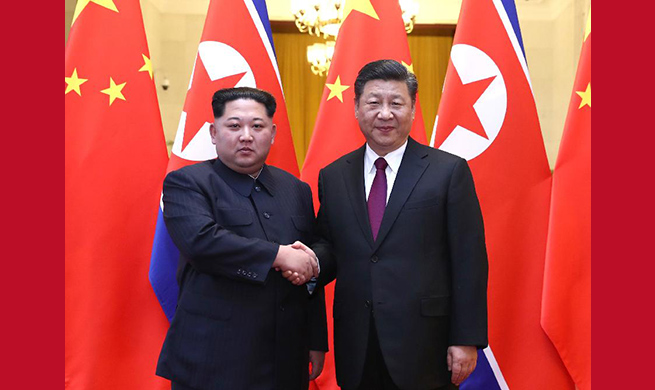NEW YORK, March 29 (Xinhua) -- Unilateral sanctions can't resolve the U.S. trade deficit problem but will instead significantly hurt businesses and consumers in both the United States and China, a trade expert has said.
"The U.S. trade deficit, as a whole, can't be defined only by the level of Sino-U.S. trade," Xu Chen, chair of China General Chamber of Commerce-USA (CGCC), the largest non-profit organization representing Chinese enterprises in the United States, told Xinhua in a recent interview.
"(It) is a direct result of the domestic demand-driven economic structure."
Despite strong warnings from business groups and trade experts, U.S. President Donald Trump last week signed a memorandum that can impose tariffs on up to 60 billion U.S. dollars of imports from China and restrict Chinese investments in the United States.
Xu said over the past two decades, the U.S. economy has been characterized by higher consumption rates but lower savings rates, which is the root cause of the trade deficit,
But that trade deficit, to a certain level, is also necessary for the U.S. dollar to play its role as an effective global reserve currency, he pointed out.
According to Brussels-based payment operator SWIFT, dollar-based transactions account for approximately 40 percent of all international payments.
As a major supplier of global reserve currencies, the United States "needs to tolerate a certain degree of trade deficits to provide a sustainable supply of U.S. dollars," Xu, who is also president and CEO of Bank of China USA, said.
He also said China's trade surplus with the United States is overstated. The United States has a "multi-billion-dollar trade service surplus with China based on comparative advantages."
According to the Chinese Academy of Social Sciences, from 2010 to 2013, the U.S. deficit in goods trade with China, when measured by the value-added approach, was actually 48-56 percent lower than the conventionally calculated figure.
Xu said the imposition of additional tariffs on goods imported from China will be nothing but a tax on American consumers, just like the impacts of the recent tariffs on imported steel and aluminum.
According to U.S. investment research company Morningstar, the average price of a U.S. car will rise 1 percent overall due to the 25 percent tariff on steel imports and 10 percent on aluminum imports, which is about 300 dollars per vehicle.
"Strengthening economic cooperation between China and the U.S., the two largest economies, is far more beneficial to both countries as well as world markets," Xu said.

















